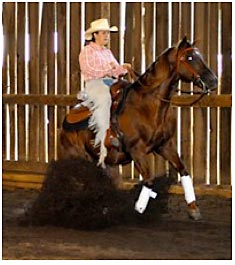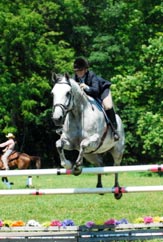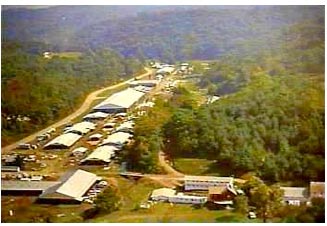 |
 |
|
Horse Breaking vs. Horse Training by Ron Meredith
Many people who are training horses will ask them questions that the horse has no way of understanding or answering.
Then they will fight with the horse or hold him hostage until the horse either gives in or gives up.
The so-called trainer walks away feeling like he or she has won the game because the horse finally did what they wanted him to do. But no actual communication took place. What happened was
"breaking" not training.
When you break a horse rather than train it, you get a trained flea. What do I mean by that? Well,
you start training fleas by putting them in a jar. You know they are going to jump and if they do
that, they'll jump out of the jar. So you put a lid on the jar. Now when the fleas jump, they hit their
heads on the lid. Being smart fleas, they learn not to jump so high. Now you can take the lid off
and they won't jump out. Voila! You have trained your fleas not to jump so high. That is exactly what you do when you "break" a horse.
A lot of people train horses this way. They condition the  horse to random tasks one by one. horse to random tasks one by one.
They do not do it in a systematic way that is logical to the
horse. Remember that horses have very simple minds. They can only connect a cause-and-effect sequence of about two steps. To be horse logical, the next thing you
teach a horse can never be more than one step away from the thing you just taught him and not more than two steps away from the thing before that.
It should be easy for the horse to understand how to do the next thing you want to teach him because it should flow naturally from the last thing he learned. It should be
horse logical for him to behave in a certain pattern. He shouldn't have to guess about what you want until he accidentally gets it right. He shouldn't have to stress
himself mentally or physically until he learns to do the "correct" thing by avoiding the "incorrect" thing.
At Meredith Manor we teach our horses a "language" based on their body position, relative to ours.  The horse first learns on the ground that certain body language on our part calls for him to be
in a certain position relative to our own. With this as a basis for understanding, we gradually shift the concepts of mirroring the trainer
and working in a corridor of aids from ground work to under saddle work and eventually to whatever game we ultimately want the horse to play. The horse first learns on the ground that certain body language on our part calls for him to be
in a certain position relative to our own. With this as a basis for understanding, we gradually shift the concepts of mirroring the trainer
and working in a corridor of aids from ground work to under saddle work and eventually to whatever game we ultimately want the horse to play.
Horse showing is a game a lot of people like to play with their horses. Someone defines some rules, prescribes a set of mannerisms, and the
guys whose horses come the closest to those prescribed mannerisms are the winners. When it gets too easy to win, the somebodies change
the rules so it takes something different to win the game. And everybody's off again. Horse show rules are no more logical than the
rules we make up for football or basketball. They're all just artificial rules that can get changed at any time.
We teach our horses to perform according to these prescribed mannerisms to make them competitive at the horse show game. When you are training, it is important to remember that
producing a prescribed mannerism should not be your highest goal. The way you mentally and physically gymnasticize the horse is the real game. The horse show mannerisms are only a way for
you to demonstrate that you and your horse are physically and mentally prepared.
If you've only learned to duplicate the mannerisms, you and your horse are going to be left behind
when the somebodies change the rules. If your horse was properly trained, horselogically gymnasticized both mentally and physically, you'll be able to adjust to the new game rules.
As your horse's trainer, you mentally take command of the horse's muscle and strength and use it
to play whatever the game you want to play with your horse. Whether it's polo, cutting, reining,
jumping, pole bending, barrel racing or whatever other game you're playing, the real game is the
interaction between you and the horse. It is about mental, not physical control. And that control has to be methodical and horse logical for you and the horse to play the game as well as you can.
Training horses is about developing the horse's mental attitudes to the point where they enjoy playing the same games that you do. That means taking mental control of your horse. The
controlling factor is not strength, not size, not speed. The horse is ten times stronger, bigger and faster than we are.
Let other people be the ones who jerk on horses and slap them around or hassle them until they've
"learned" something. You want to be the one who can communicate with the horse using horse
logical emotions, horse logical shapes and change them from what they aren't into what they can
be by using what they are to start with. Training is about what to do rather than about what not to do.
Meredith Manor International Equestrian Centre
Meredith Manor is an Equestrian Career College dedicated entirely to producing professional riders, trainers, instructors,
and farriers for the horse industry. All programs and courses are designed specifically to prepare you for a successful equine career. Our programs range in length from 3 to 18 months, and our
students spend 6 hours a day in primarily hands-on, skill based classes with additional time spent in the barns and with the horses. Students don't have to excel in
academic, classroom based classes to be successful in our programs, but they must have a passion for horses and a dedication to having a successful equestrian career.
Meredith Manor's name and reputation are known by serious horse people throughout the world. Students from the ages of seventeen to sixty-three have attended the School from every state and
many foreign countries. Meredith Manor strives to provide a climate of learning in which each student may identify and accomplish his or her goals. We have continuously researched the horse
industry, designed the facilities, and developed the educational programs that will give our students
the training, experience, and confidence needed to have successful, life-long careers with horses!
Ron Meredith has over forty years' experience as president of the school and has developed it
from its humble beginnings of six students in 1963 to its current world class level. Because of his
outstanding contributions to the horse industry and specifically to equestrian education, he has received a number of distinctive recognitions including an Honorary Doctorate of Equestrian
Studies. Dr. Meredith has held seven AHSA judges' cards and has trained top level horses and riders in the cutting and reining world.
Contact: Meredith Manor International Equestrian Centre
147 Saddle Lane
Waverly, West Virginia 26184
Phone: 800-679-2603
Email: info@meredithmanor.edu
Website: www.meredithmanor.edu
|
 |
|
To advertise your horse product or service, contact Ann
|
 |
|
InfoHorse.com, Horse Information Lives Here ® 2/23/2026
Contact Us to Advertise to over a million Horse Owners.
All images and content Copyright© 2012 by InfoHorse.com, Equusite.com.
Horse Owners are Dog Owners; Dog Product Information dognowner.com
|
|
|
Articles, Academic Schools, Arena Maintenance, Animal Communicators, Barns, Barn and Accessories, Barn Equipment and Tractors, Breast Collars, Grooming Products for Horses, Hay Feeders, Horse Blankets, Horse Books, Horse Videos, Horse Breeders, Horse Camping Gear, Career Schools, Carts and Buggies, Horse Training Clinicians, Equestrian Clothing, Dogs and Puppies, Horse Fencing, Western Art & Furniture, Horse Property for Sale, Horse Products For Sale, Fly Control, Foal Care, Horse Footings, Horse Gifts, Horse Health and Nutrition, Hoof and Leg, Horse Insurance, John Lyons Certified Trainers, Equine Lawyers, Leather Care, Links, Horse Property, Horse Photography, Portable Horse Stalls, Arenas and Roundpens, Horse Riding Schools, Horse Schools, Safety Products, Services for Horses, Horse Trailers, Horse Shipping, Horse Skin Coat Care, Horse Software, Specialty Trainers, Horse Summer Camps, Tack, Horse Trainers, Treats and Snacks, Truck Accessories, Trucks, Horse Vacations, Western Lifestyle, jewelry
|
|
|
|